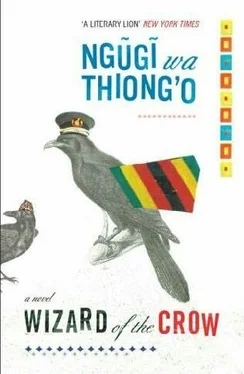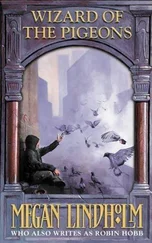“Listen carefully,” she told Vinjinia. “Friday is the Day of the Way at the shrine. I want you to come back dressed like any ordinary working person, and on foot like most clients. Bring some traditional women’s clothing with you: twelve leather skirts with front aprons and twelve red-ochered tops.”
By evening the following Friday, Vinjinia was back at the shrine, seated among the other seekers of the Way, waiting her turn patiently.
“Here is the bundle,” she told the Wizard of the Crow.
“Are you ready to know the fate of your husband?”
“Yes.”
“Even if it means your coming face-to-face with those who took him away?”
“If only I could, I would let them know that I will not be silenced.”
“Everything you need is at Kaniürü’s place.”
“What! The deputy to my husband? A kidnapper?”
“Yes, the same one.”
“Who empowered him?”
“Surely you know that he is now the chairman of the Commission of Inquiry into the Queuing Mania. And remember that Kaniürü, like your husband, does not act alone. There are more powerful others behind his actions.”
“How can I free my husband?”
“I didn’t say anything about freeing him. But if you do as I say, you will at least be able to compel them to say what they have done with him.”
“What must I do?”
“My mirror tells me that a date has been set for Sikiokuu to open formally Kaniürü’s offices in Santamaria. Go home; find out the day and the hour of the ceremony. On that day, dress as you normally would for a similar occasion and be there as the ceremony begins. Show no undue interest in anything around. Tell them that all you want is to see Sikiokuu to find out where he is hiding your husband. Be firm and refuse to leave the premises until he has shown you where he buried your husband’s body. If your demand is met, leave at once and, again, show no interest in whatever else is happening around.”
“Is that all?”
“That is all.”
“You mean I don’t have to carry magic potions in my dress?”
“The most potent is the magic within you.”
From the moment that Kaniürü was notified of the day Sikiokuu would stage the opening ceremony, he had looked high and low for women dancers to grace the occasion, but in vain. He was personally despised, and no one wished to be associated with him openly. How was he going to impress Sikiokuu and the media without women dancers? Then one evening a couple of days before the ceremony, luck knocked at his door.
He was looking through the window idly, in total despair, when there appeared outside his offices a woman dressed in a long leather skirt, a front apron, and a red-ochered top with two bunches of beads hanging from her earlobes. He rushed to open the door himself.
It was a little dark in the corridor, but on hearing what she had to say, that she was bringing a message from a group of dancers, Kaniürü was so elated that he started jumping up and down like a little child before swearing before the woman that if indeed she could get him a group of women dancers to perform for Sikiokuu he would personally ensure that the group got two new buses with which to start their own transport business.
He was so excited at his new luck that he did not ask many questions about the woman and her group, for he did not want to frighten his good fortune away.
So Kaniürü himself called the newspapers and radio and TV stations to tell them of the occasion. On the morning of the scheduled event he called again as a reminder, adding that something dramatic would be happening.
Most satisfying was the sure knowledge that, at last, his picture, he and Sikiokuu mobbed by adoring dancers, would finally appear in the press.
The dancers were among the first to arrive. In traditional garbs, they all looked much the same. But though difficult to distinguish one from the other, as a group they were impressive to an onlooker. Kaniürü delayed meeting them formally before the arrival of the media. But the women did not seem to mind as they settled in the yard preparing themselves for their act. The guests were mostly those who wanted to buy favor in anticipation of the abundant windfall for Marching to Heaven.
For his part, Sikiokuu had brought his own state photographers, but it was not until press reporters and cameramen arrived that Kaniürü and Sikiokuu stepped out into the yard and took their places, ready to be showered with praises by the dancers, now arranging themselves into a formation. As they were about to start, Vinjinia arrived.
She was startled to see the dancers in the traditional ensembles that she had taken to the Wizard of the Crow. They had cost her quite a sum, but now she was inwardly glad to see how striking the clothes had turned out to be. Mindful of the instructions at the shrine, she tried not to show any interest in them, and she made a beeline toward the front row where other guests sat. I want to speak to Minister Sikiokuu, she said loudly.
All eyes, including the dancers’, now turned to the woman.
Sikiokuu leaned toward Kaniürü and asked him who the woman was. A crazy woman, Kaniürü replied, but because he did not want any commotion before the press, Kaniürü tried to diffuse the situation by asking the woman loudly and in a friendly voice, Mother, what do you want? Vinjinia, just as loudly, said that she simply wanted to know where the government had buried the body of her husband, Tajirika. Sikiokuu did not react one way or another; he stared straight ahead as if he had not the slightest clue as to what Vinjinia was talking about. Kaniürü gestured to some policemen to take the woman away. Vinjinia screamed in protest. By now the press photographers were snapping away. Sikiokuu saw that the situation might get out of hand and ordered the police officers to stop manhandling the woman. Kaniürü was fuming with anger, for this was not exactly the kind of drama he had promised the press, but he did not know what to do. Vinjinia was shouting and demanding to know if her husband was alive, and if not the authorities should take her to his grave. In desperation Kaniürü turned to the dancers and instructed them to start their performance.
One of the women, as if in response to Kaniürü’s appeal, raised her voice in song while the others responded with undulating hip and hand movements punctuated by rhythmic grunts.
When I came here to sing praises to the visitor
I did not know that it was to a house at war
I do not sing in houses at war
My song might become cacophony
And my voice gets lost in my throat
For though you see me dancing
I have a husband and a child to look after
I would not want the child to lose a father
For a home is father, mother, and child
On hearing their song, Sikiokuu realized that unless he did something drastic, the situation would worsen, might become as shameful as what had happened at Eldares, and how would the Ruler react if the news was to reach him in America? He stood up and asked the women to stop singing for he had something to say to the media.
He had come here, he said, to formally open these two important offices and also make a statement. He had planned to say what he had to say at the end of the ceremony, but mindful of press deadlines he thought it better to do so now, not wanting to risk the possibility of some reporters having to leave early. Uppermost in his mind were two issues:
The first concerned Nyawlra, the outlaw. The government was aware that she was hiding among the people, and he wanted to remind them that everyone was duty bound to report her to the nearest police station. Whoever harbored the fugitive would be as guilty of treason as the criminal. He wanted to emphasize, however, that if Nyawlra herself surrendered to the authorities as her own father had asked her to do, she would not be harmed in any way. She would be tried fairly under the laws of the land. He then announced a reward of fifty thousand Burls for anybody providing information leading to the arrest and successful criminal prosecution of the said Nyawlra for crimes against the State.
Читать дальше












